Pregnant mothers' stress during floods can disadvantage their babies

New South Wales and Queensland are in the grip of a major flood crisis. Homes have been swept away, businesses inundated, and thousands evacuated.
Natural disasters like this are devastating, and in the rescue and recovery efforts it's important to protect a particularly vulnerable group: pregnant mothers and their unborn babies.
When the floods hit Queensland in January 2011, we were a part of a research team that tracked the health and well-being of pregnant mothers. We also investigated the impact of this prenatal stress on the development of their babies until six years of age.
We found higher prenatal stress was associated with a range of negative impacts among the children as they grew up.
But these aren't inevitable, and ensuring pregnant women get appropriate support during and after a disaster can make a big difference. Choosing the right coping strategies can also help.
So what is flood stress, and what are the effects on mothers and babies?
There are two main types of flood stress. Objective stress is what happens to you: your house is flooded, your possessions are damaged or lost, you have to evacuate, you or your loved ones are injured or in peril.
Subjective stress is your emotional reaction: shock, distress, anger, anxiety, depression.
In our study, mothers who experienced more objective stress reported more immediate subjective stress, which led to longer-term depression, anxiety and post-traumatic stress.
This prenatal stress also affected children. Babies of stressed mothers were more likely to have a difficult temperament and lower social and problem-solving skills.
As toddlers, they were more likely to have poorer cognitive development, and poorer motor development including both fine (such as drawing) and gross (such as crawling) skills. They also had a higher likelihood of behavior, sleep and interpersonal problems.
As preschoolers, they were more likely to have anxiety symptoms and poorer motor development.
It seems strange to think that what a pregnant mother feels could affect her baby, but stress feelings are underpinned by stress hormones like adrenaline and cortisol. These hormones can change the way the placenta works.
They can also cross the placenta and disrupt the unborn baby's developing stress regulation system, which affects their reactions to stressful events and situations after they're born. What happens during pregnancy lays the foundation for health and development across the life course, which is why the consequences of prenatal stress can last for so long.
What can we do about it?
This all sounds very serious, but negative consequences aren't inevitable. Our research team found a range of strategies can reduce harm and protect the health of mothers and babies.
Continuity of maternity care during pregnancy matters. At a minimum this means keeping your antenatal appointments, and telling your health-care professional you've been affected by the floods.
Even better, find a hospital that offers midwifery group care, where the same midwife cares for you throughout pregnancy, birth and postpartum. Compared to standard care, where you see a different midwife at each appointment, flood-affected mothers in our midwifery group care program had lower depression and anxiety and their baby's early development was better.
It's also important for pregnant mothers to keep their diet consistent, even though this can be very difficult in a flood crisis when usual food and eating patterns can be disrupted. Eating less dairy, more sweets, skipping meals or stopping multivitamins was linked with differences in infant head circumference, suggesting diet changes affect the way the developing baby grows.
Here's how you can cope
Choosing the right coping strategy for the situation can also help.
Emotion-focused strategies reduce distress in situations you can't control, and are the best strategies during a flood crisis. These include positive reframing, acceptance, humor and emotional support.
Problem-focused strategies are great for situations where your actions can solve the problem. These might help during the recovery, and include planning, taking action, and getting help or advice.
Dysfunctional coping strategies can add to your stress in the long-term, including venting, distraction, avoiding and self-blame. It's OK to vent occasionally—sometimes you need to get things off your chest. But once you've done that, activate the coping strategies that are the best match for the situation you're in.
Keep things in perspective. In these days of a 24/7 news cycle and doomscrolling social media, we're surrounded by distressing images. You might feel very distressed about what's happening to others, even if the direct effects on you and your family are small.
Limit your exposure to distressing stories and images if they start affecting your mental health. Trying to find the positives, like neighbors working together to support each other, can also help.
Seek help if mental health symptoms persist. It's natural to feel angry, shocked, upset and anxious in the face of a natural disaster. In a month, if you're still experiencing strong feelings that affect your daily life, talk to your GP and seek further support.
Pregnant mothers need to be supported with high quality maternal care. Health-care professionals must also regularly screen mothers for psychological distress during pregnancy and through early childhood. It's even more important in natural disasters, where stress is long-term.
But around 20% of pregnant Australian women don't receive this recommended screening. It needs to be an integrated part of helping communities bounce back after these devastating floods, from the initial crisis through the long recovery process.
This article is republished from The Conversation under a Creative Commons license. Read the original article.![]()



















